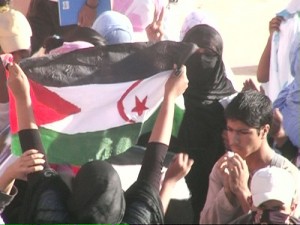
At first glance it seems surprising that representatives of Morocco and the Polisario were negotiating the future of the disputed Western Sahara region while the territorial capital of Laâyoune and the protest camp erected outside the city were shrouded in smoke after security forces had violently dispersed demonstrators. But the two sides talking on November 8 and 9 under the auspices of the UN in Manhasset, near New York, may for once have had some motivation to accelerate the process towards the resolution of a 35-year-old impasse.
A new force appears to have been born made up of disaffected Sahrawis who have other things on their minds besides the status of their land and the colours of a flag. Indeed, banners were conspicuous by their absence at the Gadaym Izik camp, where some 20,000 people had been for several weeks. There was no Sahrawi Arab Democratic Republic crescent and star, confirming that this protest was not orchestrated by the Polisario from its refugee-populated desert base in Algeria; nor were there green Moroccan pentangles, meaning that the demonstrators were protesting at the system of rule, and were not just loyal subjects entreating King Mohammed VI’s regime for improved housing and social conditions.
Despite the money Rabat pours into what it calls its southern provinces, Western Sahara is economically backward. Unemployment is reported to reach rates of 25 percent (even higher than in Morocco itself), the extraction of phosphates has become a less lucrative business, the possibility of offshore oil exploration is too sensitive to go ahead with any conviction and infrastructure remains extremely sparse. The government has spent lavishly to encourage ethnic Moroccans to become the majority in the former Spanish colony’s 500,000-strong population through various subsidies and offers of laid-back government jobs. El País has cited the Moroccan economist Fouad Abdelmoumni’s calculations that military expenditure, subsidies and tax breaks in the region take up seven percent of Moroccan GDP, a sum which, if removed, would add three percentage points to the country’s growth rate.
After years of such sacrifices to tame the desert region, Morocco is not going to back down and allow a self-determination referendum to take place, as the UN and international law on decolonisation demand. Nor is anyone going to force it to comply, with the Polisario’s occasional threats carrying little weight since the Cold War ended and the pipeline of Soviet weaponry via Algeria having dried up. Rabat has now spent half a decade talking about an autonomy plan, which has been backed in principle by allies such as Spain – whose refusal to condemn the security forces’ violent breaking up of the protest camp has been notable. But the details remain on the drawing board of organisations such as the Corcas, the group of tribal leaders from Western Sahara set up to deal with the region’s specific issues after a previous spate of unrest. Those demonstrating at the camp outside Laâyoune were surely also stating dissatisfaction at this somewhat toothless body, which has not overseen any significant initiatives to improve conditions in the territory.
A new generation
Civil campaigns, such as the well-publicized hunger strike protests by activists such as Aminatou Haidar, have inspired a new generation of Sahrawis, whose ties with the distant and ageing Polisario leadership are bound to weaken. Haidar herself criticized the Polisario’s decision to negotiate with Morocco in the midst of the violence in Laâyoune, although, when asked, she accepted the organisation’s continued role as sole representative of the Sahrawi cause.
It is surely a question of time before some deal on autonomy is reached, although as long as Algeria (content to see its neighbour and rival pouring great chunks of its meagre economic gains into Western Sahara) continues to prop up the Polisario, the status quo may tend to persist. Now, apart from the fate of the tens of thousands of refugees in the Polisario’s desert camps and the need to better exploit the region’s resources, there is an added need to reach a solution: the capacity of the local population to organise itself against the regime. Morocco needs to put a regional government in place, and fast.
Leave a Reply
You must be logged in to post a comment.